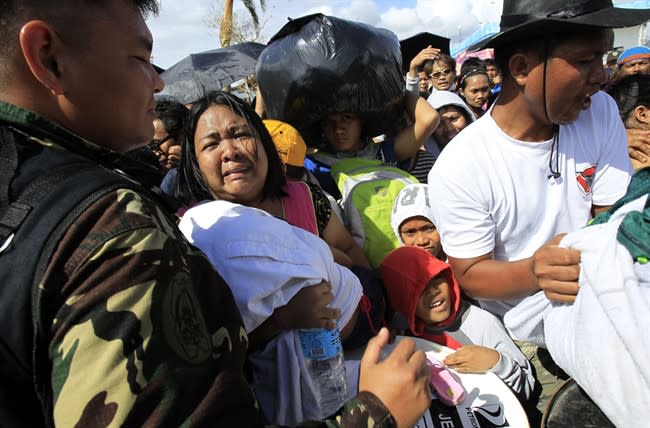Night flights begin to arrive at typhoon-devastated Philippine city as aid effort gathers pace
TACLOBAN, Philippines - Soldiers sat atop trucks distributing rice and water on Thursday in this typhoon-devastated city and chainsaw-wielding teams cut debris from blocked roads, small signs that a promised aid effort is beginning to pick up pace even as thousands flocked the airport, desperate to leave.
The first C-130 transport planes arrived at 3 a.m. at Tacloban airport, the first nighttime flight since the typhoon struck on Friday, suggesting air control systems are now in place for a 24-7 operation — a prerequisite for the massive relief operation needed.
Food, water and medical supplies from the U.S., Malaysia and Singapore sat on pallets along the tarmac.
The U.N.'s World Food Program distributed rice and other items to nearly 50,000 people in the Tacloban area Wednesday. Nearly 10 tons of high energy biscuits were also delivered to the city on Wednesday, with another 25 metric tons on the way.
Military officials were among the thousands waiting outside the airport trying to get their families out.
"My family has nothing to eat, and we have no place to stay," said Sgt. William Escala. We cannot bear the stench. The kids are getting sick."
Hundreds of injured people, pregnant women, children and the elderly have poured into a makeshift medical centre at the ruined airport. The run-down, single-story building with filthy floors has little medicine, virtually no facilities and very few doctors.
Doctors who have been dealing with cuts, fractures and pregnancy' complications said Wednesday they soon expect to be treating more serious problems such as pneumonia, dehydration, diarrhea and infections.
The medical woes add to the daunting tasks for authorities, including dealing with looters and clearing the bottlenecks holding up thousands of tons of aid material from coming in.
While the cogs of what promises to be a massive international aid effort are beginning to turn, it is still not quick enough for the 600,000 people displaced, many of them homeless, hungry and thirsty, their livelihoods destroyed.
Much of the aid — and the staff needed to distribute it — is stuck in Manila and the nearby airport of Cebu, a 45-minute flight away.
"The priority has got to be, let's get the food in, let's get the water in. We got a lot more come in today, But even that won't be enough, We really need to scale up operation in an ongoing basis," U.N. humanitarian chief Valerie Amos told reporters after touring Talcoban, the capital of Leyte province. Her office has released $25 million in emergency relief fund, accounting for a chunk of the millions of dollars pledged by countries around the world.
Some among the desperate residents have resorted to raiding for food. Mobs overran a rice warehouse on Leyte, collapsing a wall that killed eight people. Thousands of sacks of the grain were carted off. But police say the situation is improving on the ground.
Philippine Energy Secretary Jericho Petilla said it may take six weeks before the first typhoon-hit towns get their electric power back. He said that in Tacloban, order needed to be restored "because if there's no peace and order, it's hard to reinstall the power posts."
He said army troops had fired shots Wednesday to drive away a group of armed men who approached a power transmission sub-station in Leyte province. The unidentified men fired back then fled. Nobody was hurt.
The death toll rose to 2,357, according a national tally kept by the disaster agency. That figure is expected to rise, perhaps significantly, when accurate information is collected from the whole disaster zone, which spreads over a wide swath of the eastern and central Philippines but appears to be concentrated on two main islands — Leyte and Samar.
Gegham Petrosyan, from International Committee of the Red Cross, said destruction along the south cost of Samar island had been "massive."
"People are desperate for life-saving aid," Petrosyan said. "However, logistical and security constraints continue to hamper the distribution of desperately needed relief."
__
AP writers Chris Brummitt and Teresa Cerojano in Manila contributed to this report.



